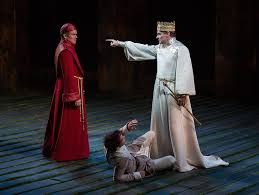
CFP: ClioS International Conference, 11-12/02/2022 : “ Shakespeare, the Contemporary and the Postmodern Stage ”
« Shakespeare, the Contemporary and the Postmodern Stage » Sorbonne Université, Maison de la recherche 11-12 February 2022
Since the turn of the 21st century, Shakespeare’s plays, and in particular his histories, have been through an unprecedented revival on both sides of the Channel. The phenomenon (which has also concerned some of his contemporaries, like Marlowe) has been variously attributed to a desire for epic forms in a context of political and social crises, and to the craze for serialized productions induced by the popularity of TV series. Shakespeare’s presence is also ubiquitous in contemporary dramatic creation. The late 20th– and 21st-century stages have adapted, performed, and transformed the plays of Shakespeare and his contemporaries accordingly and used them to probe into the major conflicts of the present. While claiming that he is “a citizen of Auschwitz and Hiroshima”, Edward Bond thus rewrites King Lear. Locating her plays in the ruins of a concentration camp, Sarah Kane, in Cleansed, exacerbates a love story between siblings inherited from Shakespeare’s Twelfth Night and Ford’s ‘Tis Pity She’s a Whore. Meanwhile, Martin Crimp goes back to Marlowe’s Edward II to investigate State violence in Lessons in Love and Violence, the 2018 “text for music” he wrote for composer George Benjamin. These examples contribute to defining a theatre of immediate history the relevance and poetics of which will be at the centre of our preoccupations. From the Shakespearean striking effect to the post-Brechtian “Aggro-Effect”, contemporary dramatists have often explicitly turned to Elizabethan drama for thematic as well as formal inspiration. Paradoxically enough, Shakespeare and his contemporaries are still often seen as a matrix for contemporary creation.
But for many contemporary performance practitioners, the cultural centrality of Shakespeare is seen as a hindrance to creativity and innovation. The current climate, shaped by populism, nationalism, post-truth politics, and a crisis of trust in political leaders and institutions, throughout Europe and beyond, has created new responsibilities both for the theatre and for scholars in the arts and humanities actively to engage in cultural debates. We are convinced that this requires an awareness of history and the productive exploration of continuities and disruptions between the early modern past and the contemporary. This conference aims at interrogating the idea of the “contemporary” in dramatic creativity – what it means to Shakespeare and other early-modern authors, and to playwrights writing today. Shakespeare and his contemporaries – who engage with issues of nationhood, civil unrest and strife, mistrust in leadership and popular uprising – will be our prism.
“Contemporaneity is in fashion”, writes Pedro Erber (29) in a critical comment on the current debate in philosophy, politics, literary criticism and the arts. This ‘fashion’ seems to be motivated by the desire to respond to what is considered by many as a new historical period at the beginning of the 21st century. In his essay “What is the contemporary?”, Giorgio Agamben has argued that the ‘true’ contemporary must speak from a liminal, or ‘untimely’, position with regard to the present moment in order to be able to see its contradictions, its dependence on the past and its latencies. To think of Shakespeare (and other early modern authors) as contemporaries of ours in this sense would seek to establish, in the here and now, a dialogue between the early modern and the present from which such an ‘untimely’ gaze could emerge. Such a project moves beyond nostalgia and commemoration on the one hand, and Presentism’s exclusive focus on the current moment on the other.
This conference on “Shakespeare, the Contemporary and the Postmodern Stage” is inspired by these ideas about the paradox, anachronism, and diversity of the “contemporary”. It will focus on the following questions:
- Are Shakespeare (and his contemporaries) – half a century after Jan Kott’s seminal monograph (1965) – still or, perhaps, once again “our contemporaries”? In what respects are they our contemporaries?
- Can Shakespeare act as a contemporary in Agamben’s sense, i.e. as a prism through which to re-examine our own age to get a more complex picture of the present? How can we use Shakespeare productively to think about, for instance, gender and race relations, or about relations between religions? Or about issues of governance and social and political order?
- How do contemporary theatre and contemporary productions address present-day conflicts and crises through Shakespeare and his contemporaries (whether to embrace or to reject them), and for what audiences? In what do the language and poetics of early modern drama still stimulate the contemporary imagination?
- What is particular about these responses to Shakespeare and early modern drama in general? (How) do they connect the past with the present? Are Shakespeare and his contemporaries still a matrix for the elaboration of today’s theatre of immediate history?
- How do digital media contribute to embedding Shakespeare (and early modern drama in general) deeply in today’s everyday culture by scattering, sampling, and disseminating him (cf. Garber xvii ref)?
- A focus on specific plays and their productions will be appreciated.
Organizing committee: Elisabeth Angel-Perez (Sorbonne Université), Line Cottegnies (Sorbonne Université), Gordon McMullan (King’s College London), Sabine Schülting (Freie Universität, Berlin).
A conference organized under the patronage of the VALE and PRITEPS research centres and the “Initiative Théâtre” programme of Sorbonne Université.
References :
Agamben, Giorgio. “What Is the Contemporary”. In What is an Apparatus? And Other Essays, trans. by David Kishik and Stefan Pedatella. Stanford, CA: Stanford UP, 2009, 39-54.
Erber, Pedro. “Contemporaneity and Its Discontents”, Diacritics 41.1 (2013), 28-48.
Elsom, John (ed.) Is Shakespeare Still Our Contemporary?. London: Routledge, 1989, e-book Taylor and Francis, 2004.
Garber, Marjorie. Shakespeare and Modern Culture. New York: Random House, 2008.
Grady, Hugh (ed.). Presentist Shakespeare. London: Routledge, 2007.
Kott, Jan. Shakespeare our Contemporary. Trans. by Boleslaw Taborski. 1965; repr. London: Methuen, 1972.
Worthen, W. B. “Jan Kott: Shakespeare Our Contemporary”. Forum Modernes Theater 25.2 (2010): 91–97.